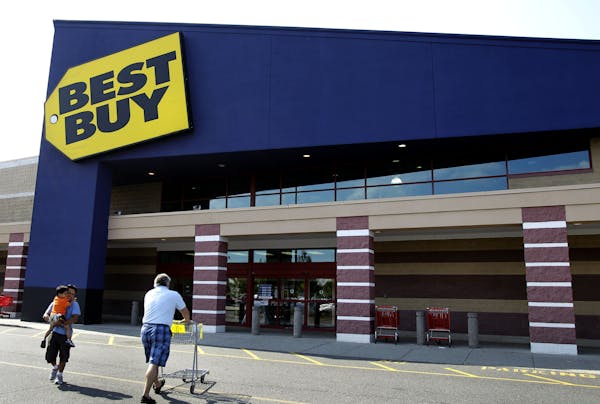Best Buy Co. founder Richard Schulze may have abandoned his eight-month quest to acquire the company, but the former chairman and CEO still has many ways to influence the retailer.
In a rare public statement Friday, Schulze acknowledged that his plan to effectively seize control of the board with the help of three private equity firms came up short. But Schulze, who still controls 20 percent of Best Buy shares, has not yet decided whether to fill the two board seats the company agreed to grant him under a prior agreement.
By rejoining the board, Schulze would need to demonstrate a certain degree of obedience to Best Buy's leadership. But as an outsider, Schulze could make yet another attempt at a later time to remake the board to his liking and reclaim his position as chairman, experts say.
"He's preserving his options," said Hillary Sale, a professor of law who specializes in corporate governance issues at Washington University in St. Louis. "He can leverage things better on the outside than on the inside with only two board seats."
Schulze, who founded the company in 1966 with a single music store in St. Paul, built the company into the nation's largest consumer electronics retailer with 160,000 employees, including 8,000 in Minnesota. Except for a few open letters to Best Buy's board, he has not spoken publicly about his efforts to buy the company.
Schulze failed to submit a buyout bid for Best Buy by Thursday's deadline, which means he can't try again until next year, per his agreement with the company. As a result, Schulze said he would give CEO Hubert Joly and chief financial officer Sharon McCollam time to turn around Best Buy without his direct involvement.
"Mr. Schulze believes ... that the company deserves a chance to implement its own plan," said the statement he filed Friday with the Securities and Exchange Commission. "No one is more interested in the success of the company than Mr. Schulze."
Best Buy has been beset with sagging sales and a declining stock price over the past few years. The company reported on Friday better-than-expected sales and profits for the fourth quarter, a strong performance that sent the stock up nearly 5 percent Friday.
But a source close to Schulze said the founder still believes the company is troubled and lacks a long-term strategy. Since joining the company in September, Joly has worked hard to reach out to Schulze. Rather than launching radical changes that could alienate Schulze, Joly has so far offered practical solutions to Best Buy's immediate problems.
'Show their cards'
Now that Schulze has abandoned his bid, "the board and management have to show their cards" on their future vision for the company, the source said.
Since last spring, Schulze has been engaged in the high-stakes effort to acquire Best Buy since shortly after he was forced to resign from the board. He recruited major private equity firms — Texas Pacific Capital, Leonard Greene & Partners, and Cerberus Capital Management — to help finance a bid that would have been worth more than $8 billion. In December, the Star Tribune reported that Schulze was about to submit an offer but then granted a last-minute request from the company to extend the deadline to Feb. 28 so Schulze and his investors could fully assess Best Buy's holiday performance.
Best Buy's sales surpassed Wall Street's expectations. Over the past 10 weeks, the stock jumped about 50 percent, making an buyout vastly more expensive for Schulze and his partners. But the source close to Schulze insisted he had locked down the financing.
"He had the money," the source said. "I know there's a lot of people who would like to believe he didn't."
Nevertheless, Schulze decided to pursue a less expensive but more complicated two-pronged strategy. The three private equity firms would each gain one seat on the board by purchasing a minority stake in the company. Combined with Schulze's two seats, the group would control almost half of the 11-member board. After six months or so, Schulze and his allies would steer Best Buy into private ownership under their control, the source close to Schulze said.
The firms ultimately offered bids ranging from $400 million to $700 million for stakes in the company, according to a source close to the situation. But the board rejected the offers. In a conference call with analysts Friday morning, Joly said the offers would have been "dilutive" to Best Buy's existing shareholders. That suggests the private equity firms wanted the company to sell them new shares that were either under market value or offered benefits like additional voting power, the payment of a special dividend, or the right to purchase more shares at favorable prices.
Another major sticking point: Schulze wanted his old post of chairman, but the board refused, the source close to the founder said. The board also rejected the possibility that former CEO Brad Anderson, who assisted Schulze's buyout efforts, could get a board seat.
Some analysts hope that Schulze will now step aside.
Schulze's continued presence on the board "would upset the relatively harmonious way the board has been operating in recent months," said David Strasser, an analyst with Janney Capital Management.
Thomas Lee • 612-673-4113
Tennessee Volkswagen workers vote on union membership in test of UAW's plan to expand its ranks
Bitcoin's latest 'halving' has arrived. Here's what you need to know
BNSF Railway says it didn't know about asbestos that's killed hundreds in Montana town
Here's how Phish is using the Sphere's technology to give fans something completely different

